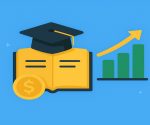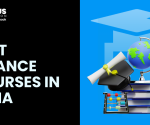By 2025, learning to manage money will be more critical than ever. A personal finance course teaches budgeting, saving, investing, and planning for the future. The courses help students and working professionals make better financial choices. A personal finance course will teach managing cash flows, alleviating debt, saving, and safely growing wealth.
Top Personal Finance Course
An introductory course covering budgeting, saving, spending, and understanding one’s finances. It is meant for those who are beginners in the area of understanding incomes and expenses to make reasonable decisions with money. Setting short-term and long-term financial goals, following cash flows, and developing better money habits are skills that can be learned. Specific personal finance vocabulary and tools that assist decision-making are introduced. It is a strong foundation for other, more advanced financial subjects.
Budgeting and Saving Techniques
The course goes deep into the 50/30/20 budgeting principles and zero-based budgeting techniques. Saving techniques are also studied for the emergency fund, major purchases, and lifestyle goals. By the end, students will be able to confidently prepare budgets that work together with saving strategies relative to their income and life goals. Case studies and templates of monthly and yearly budgets are provided. Discipline and consistency are held as the twin pillars of financial success.
Debt Management and Credit
Understanding debt entails knowledge about credit cards, student loans, and personal loans. This course helps you manage, mitigate, and evade debt traps, as well as build up your credit score. It serves any person caught up with debt or any person looking forward to making a smarter borrowing decision. Understanding credit reports, interest rates, and repayment strategies is also key, with the course offering the avalanche and snowball methods. It helps build a healthy credit profile in a reasonable time.
Investing for Beginners
This course was conceived for suitable new investors and teaches them about the foundational blocks of stock, bonds, mutual funds, ETF introductions, and compounding power. It will help you to assess risk, diversify your portfolio, and select investment vehicles in light of your financial goals and risk appetite. It paves the way to building long-term wealth. This course will cover basic meanings like ROI, NAV, SIP, and capital gain. It equips learners to start investing with courage and strategy.
Retirement Planning
Retirement planning plays a crucial role in this course regarding retirement accounts, ranging from 401(k) and IRA to PPF, to estimating future needs. It will teach you how to start early, take advantage of compounding, and prepare a retirement plan that complements your desired lifestyle. It covers inflation, taxation, and all the returns related to retirement planning. Further, the course provides calculators and tools to estimate future corpus requirements.
Tax Planning and Filing
Understand how income taxes work, what deductions and credits you can claim, and how to legally reduce your tax liability. The course covers tax filing, brackets, and how planning throughout the year can save you money. Every working adult would find this extremely useful. You will gain practical knowledge about ITR forms, tax-saving investments, and digital filing platforms. It will clarify the often confusing jargon regarding taxes.
Insurance and Risk Management
Explore various types of insurance: health, life, auto, and property. Understand how and why risk management is required. The program assists you in better policy decisions so that you and your family are protected against unforeseen events that could derail financial stability. It covers policies, contract language, coverages, and the calculation of premiums. Learners are trained on risk identification and risk mitigation through sound policy selection.
Financial Goal Setting and Tracking
This course considers defining specific, actionable financial goals and using tools to track success. Whether this means buying a home, going on vacation, or early retirement, the course helps set the timeline for achievement, compute the costs involved, and adjust financial plans when needed. You will work with the SMART goal framework and financial tracking apps. The course induces accountability and encourages regular review to stay on target.
Behavioral Finance
There is a deep look into the psychology of money. This course examines the influence of emotion, biases, and habits on financial decisions. It builds your self-awareness and cultivation of discipline to avoid impulses such as toxic spending habits, bad investment decisions, etc. Some main subjects will be discussed, like loss aversion, mental accounting, and overconfidence bias. Strategies for overcoming behavioral impediments toward better money habits will be taught.
Digital Tools for Personal Finance
Learn to use budgeting apps, investment platforms, robo-advisors, and financial calculators. This course ensures that you are equipped with technical tools to carry out personal finance management conveniently and quickly in a world where the digital arena commands hold and accuracy.
Reasons to Enrol in a Personal Finance Course
A personal finance course teaches skills for money management that change lives. Many people work hard but still have serious financial problems. The simple reason is that they never learned personal finance. Personal finance is not taught in high schools or colleges. This is why learning these skills today is very crucial.
Build a Strong Financial Foundation
Finance education constructs a strong base. Personal finance training helps plan for daily needs and future goals. It teaches tracking of income and expenditures. Establishing emergency funds and retirement plans is also covered. Insurance and income taxation are likewise discussed at financial planning courses.
Make Smarter Money Decisions
Every day, everybody makes monetary decisions. They spend, save, loan, and invest. A self-study introductory personal finance course will enable them to make informed choices. These include learning about loans and credit cards’ pros and cons, selecting good savings accounts, and figuring out where to invest. These choices save more and get rid of debt.
Improve Long-Term Financial Health
Money management classes increase future wealth. Money management classes decrease stress and increase the formation of good habits. Students learn long-term financial goals like buying a home or establishing a retirement fund. Students also learn to protect themselves from scams and bad investments. Good habits lead to freedom in the long term.
Affordable and Accessible Options
Many online classes on personal finance are either inexpensive or free. A personal finance course online, free, is suited for beginners. The courses are easy to understand, short, and efficient. They will best suit busy people or students who have a tight schedule. A free personal finance course can still offer good knowledge.
Best Online Platforms for Personal Finance Courses
Many platforms are offering great personal finance courses. These platforms help beginners, professionals, and even students learn from anywhere. These sites provide finance certification online, expert videos, quizzes, and practical advice.
Plutus Education
Plutus Education is a key player in the context of personal finance, imparting real-life knowledge and curriculum-based learning to impart real-world financial literacy. Their personal finance programs assist students and professionals, as well as entrepreneurs, to learn money management, budgeting, investing, tax planning, and debt control. Plutus Education focuses on interactive learning by combining theoretical concepts with practical applications, including simulations, worksheets, and the use of financial tools. By bridging the gap between academic concepts and everyday financial decisions, learners can be taught to make informed financial decisions with certainty in both personal and professional life.
Coursera and edx
These two platforms offer courses from top universities. The courses include topics like budgeting, investing, and saving. A student can earn a certified personal finance course completion certificate. Many courses are part of larger programs, such as a finance course for working professionals. Coursera offers the best personal finance courses, as well as those from Yale and the University of Illinois. These courses include real-world case studies and are ideal for beginners.
| Platform | Key Features | Cost |
| Coursera | University-backed certificates, quizzes | Free to Paid |
| edX | Harvard, MIT-level content | Free to Paid |
| Udemy | Easy to follow, many topics | Low Cost |
| Skillshare | Focused on practical money tips | Subscription Only |
Udemy and Skillshare
These stages center on common-sense lessons. Subjects include budgeting, contributing, and saving. A budgeting and saving course on Udemy might incorporate family budgeting, cost tracking, and money-related objectives. Skillshare offers brief recordings and ventures, making learning straightforward and fun. Udemy frequently gives an authorized individual a free course with practical workouts. These offer assistance to learners in applying concepts to their real lives.
Who Should Take a Personal Finance Course?
The personal finance course appeals to beginners, finance courses for working professionals, and a certified personal finance course.
- Courses for Students, Professionals, and Families
- Finance varies for every learner segment:
- Students need help with student loan debt, part-time income, and savings goals.
- Professionals need help strategizing around EMIS, home loans, and tax planning.
- Families need advice on budgeting, child-rearing costs, and future planning.
Personal finance management has teaching versatility. This shows how to use credit cards wisely and some tricks on EMI, while professionals teach how to make wealth over time. Families learn how to save on unnecessary expenses and make financial decisions jointly. Adding this section amplifies topical depth in your content and improves engagement. It strikes very widely among keywords such as money management course, finance course for working professionals, and financial planning course.
Personal Finance Course FAQs
1. What is a personal finance course?
A personal finance course teaches people how to save, invest, budget, and manage money. It helps people build good habits and make wise money choices for the future.
2. Is there any certified personal finance course available online?
Many platforms, like Coursera, Udemy, and edx, offer a certified personal finance course with certificates. These certificates are helpful for job seekers and working professionals.
3. Are there personal finance courses with online free options available?
Yes, websites like Coursera and edx offer a personal finance course in an online, free version. These are great for beginners who want to start learning money management.
4. Which is the best personal finance course for beginners?
The best personal finance course for beginners is often from Yale on Coursera. It covers budgeting, saving, and investing in simple terms. It is a perfect start for someone new to personal finance.
5. What is a good budgeting and saving course I can take today?
Udemy offers a great budgeting and saving course with simple lessons and real-life tasks. It helps you control spending and start saving right away.


